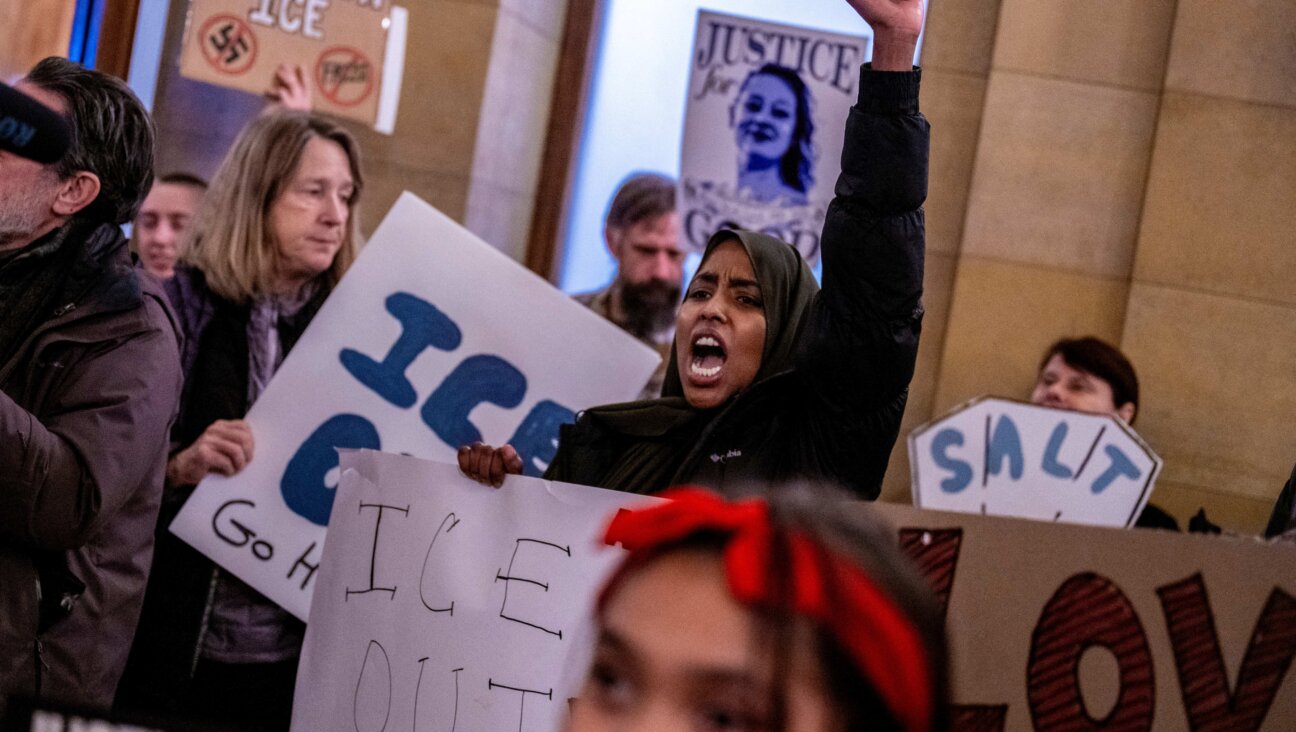Building a New Israel, Activist by Activist
When it was first performed, all the way back in 1969, there were more than a few raised eyebrows. That performance was by Lehakat Hanachal, an immensely popular military choir. But the lyrics were very far from what one might expect of a group sponsored by the Israel Defense Forces: “S’u einayim b’tikva,/lo derech kavanot;/shiru shir la’ahava/v’lo la’milchamot” — “Lift your eyes with hope,/not through a rifle’s sights;/sing a song for love and not for wars.” Make love, not war. For a time, the song — “Shir La’Shalom,” it’s called, a song to peace — was banned by the chief of the IDF Central Command.
It might have been relegated to “Kumbaya” status; instead, it became an anthem, most famously sung by Miri Aloni, flanked by Yitzhak Rabin and Shimon Peres, at the end of the monster Tel Aviv rally in support of the Oslo Accords on November 4, 1995. Rabin, in a wonderful mood because he’d feared the rally would be poorly attended, had actually sung along, and when the song was done, he turned to Shimon Peres and said, “This has been the best evening of my life.” Minutes later, he lay dying, assassinated by Yigal Amir; a blood-stained copy of the lyrics was later found in his breast pocket.
What brings this to mind just now is that I attended, the other night, a festive Jerusalem reception hosted by the New Israel Fund as the kick-off event of its annual board meeting in Israel. Some hundreds of people were there, many of them activists in the broad network of social change agencies the NIF supports, along with a group of 18 girls from Shani, an Arab/Jewish girls’ choir from Haifa. The girls sang several songs — among them, “Shir La’Shalom.” “Don’t just say ‘the day will come’; bring on that day!” And what was especially noteworthy about their performance (available, as is pretty nearly everything, on You Tube) was that they sang it not only in Hebrew but also in Arabic.
That may indeed sound Kumbaya-ish, but when it comes to Arab/Jewish relations in Israel, even the Kumbaya experience is a step forward. In the context of the NIF evening, an event showcasing the work of a dozen organizations (out of hundreds) devoted to social change, it is one of many such steps. Here, together, a new face of Israel; these NGOs are the very best examples of Israel’s emergent civil society, every bit as important to Israel’s tomorrow as is its endlessly publicized high-tech sector. (In the local CD stores, they’re featuring a series of “Classic Israeli Songs From the Good Israel That Was,” which suggests they’re out of touch with the rising reality, with the good Israel that is becoming. Nostalgia has its attractions, but it makes a very thin gruel — and in the case at hand, it is simply misleading.)
The key people of the NGOs are introduced, say a few words, and hand the microphone on. Here is the new head of the Association for Civil Rights in Israel, a young man with a background as a gay community organizer. ACRI is an old war horse of the NGO community; without its often successful legal challenges to the government, Israel’s Supreme Court would have had much more time on its hands over the years and been of much less interest and impact than it has been. Then comes a young Ethiopian woman who walked with her family through Sudan when she was 5 years old to reach this place and now organizes for the advancement of her own community as also for others who live at the margins of Israeli society. Environmentalists, educators and others, mostly young, and then veteran pursuers of social justice, pleased to be witnessing the emergence of a new generation to carry on the struggle: Alice Shalvi, winner last year of the Israel Prize, founder of the Israel Women’s Network, universally recognized mentor to generations of thoughtful feminist activists; Mordecai Bar-On, historian, long-time Knesset member, former chief education office of the IDF, above all, life-long peace activist; Nabila Espanyoli, a Christian Arab educator and activist in Nazareth, reminiscent of Janusz Korczak in the utterness of her commitment to children and in her gifts as an organizer and educator. And then, the outgoing (after six years) chairman of NIF, a man of singular decency and devotion, Peter Edelman, so moved by the occasion that when he was invited to the dais, it took him some time before he successfully fought back his tears and spoke of what the New Israel Fund has meant to him.
Years from now, when a social historian sits down to write the story of how Israel developed a civil society, how citizens learned that by working at the grass roots they could make change happen and enrich immeasurably the political culture of the place, a long chapter will surely be devoted to the work of NIF. Perhaps by then it will be able to describe how a country with such radical income inequity (tied, roughly, with the United States for first place in inequality of income) rescued its social contract before allowing it to be rendered an obsolete relic. Perhaps, too, it will acknowledge the grandeur of an intergenerational cadre that, despite the endemic exhaustion that is the chronic conflict’s toll, manages to find the energy to do battle on behalf of the once and future values that are Zionism’s — and Judaism’s — proud legacy.
All this under a full moon at the base of Mount Zion, in a land so marked by cynicism and by resignation, by corruption and by confusion. But not here, not this night.















